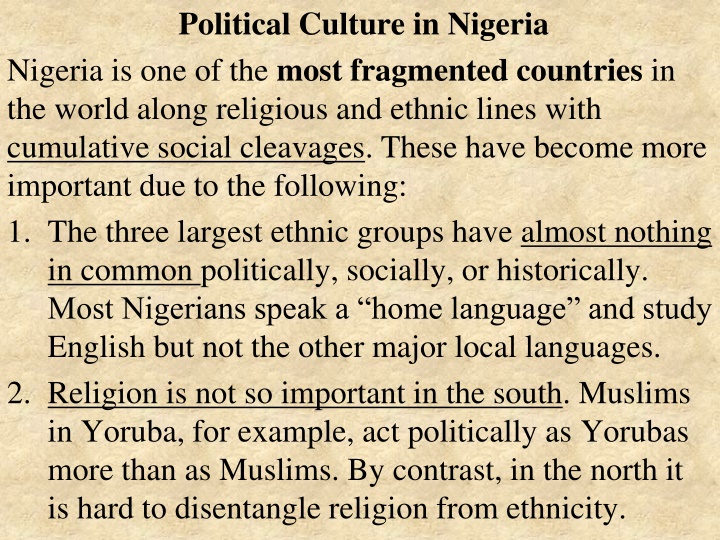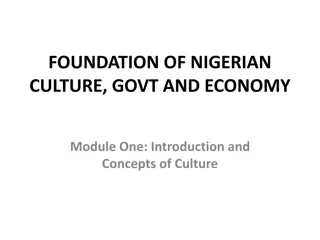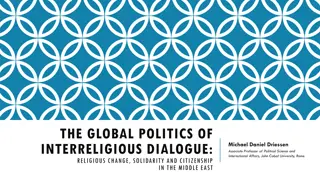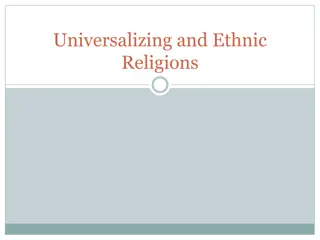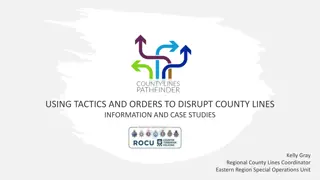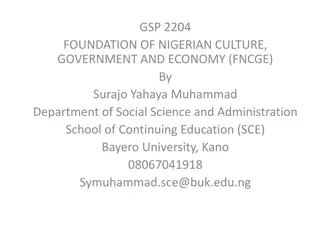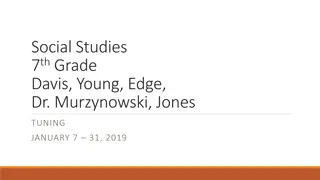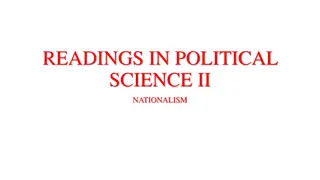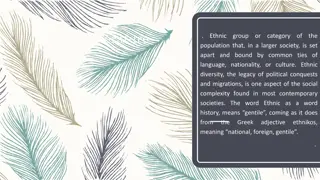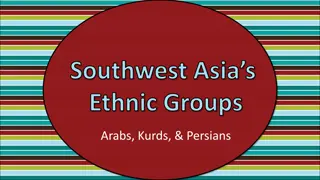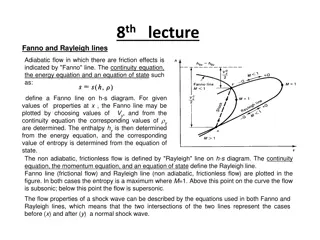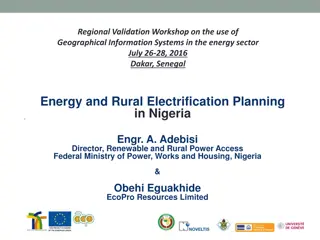Political Culture in Nigeria: Fragmentation Along Ethnic and Religious Lines
Nigeria's political culture is characterized by significant fragmentation along ethnic and religious lines, leading to social cleavages. The country's diversity in language, ethnicity, and religion influences political dynamics, with distinct differences between the north and south. Traditional structures and values, illiteracy rates, and urban-rural divides further shape Nigeria's political landscape. The elite class, predominantly from the north, plays a significant role in Nigerian politics. Women's participation in politics remains low due to traditional norms and lack of funding.
Download Presentation

Please find below an Image/Link to download the presentation.
The content on the website is provided AS IS for your information and personal use only. It may not be sold, licensed, or shared on other websites without obtaining consent from the author.If you encounter any issues during the download, it is possible that the publisher has removed the file from their server.
You are allowed to download the files provided on this website for personal or commercial use, subject to the condition that they are used lawfully. All files are the property of their respective owners.
The content on the website is provided AS IS for your information and personal use only. It may not be sold, licensed, or shared on other websites without obtaining consent from the author.
E N D
Presentation Transcript
Political Culture in Nigeria Nigeria is one of the most fragmented countries in the world along religious and ethnic lines with cumulative social cleavages. These have become more important due to the following: 1. The three largest ethnic groups have almost nothing in common politically, socially, or historically. Most Nigerians speak a home language and study English but not the other major local languages. 2. Religion is not so important in the south. Muslims in Yoruba, for example, act politically as Yorubas more than as Muslims. By contrast, in the north it is hard to disentangle religion from ethnicity.
2. (cont). Traditional political and religious leaders in the north are one and the same. Northerners follow a separate legal system, shari a, based on Islamic law. 3. There is fear in the south that a northern majority could seize power and fear in the north of southern cultural values and economic practices that may undermine their way of life. Sharp differences exist between rural and urban cultures: 1. In the countryside, where about 2/3s of Nigerians live, traditional structures and values remain strong. Elites there continued patron-client relationships in transition from their roles under British indirect rule.
Nigerians accept vertical social relations and respect authority although frequently finding ways to circumvent it. A sense of horizontal social relations is lacking, as is the idea that an individual can be socially mobile and move beyond the standing inherited at birth. 2. Illiteracy remains highest in the countryside. Most rural residents have a fuzzy idea of what national political processes are all about. 3. Urban residents, by contrast, are highly politicized and willing to take a stand on many issues. Often they are alienated from the government that cannot provide job opportunities or social services.
Elite Culture Nigeria s political and economic elites amount to a bourgeois class whose wealth stems from the state. Elites often use positions for personal gain, protecting their wealth under both civilian and military rule. The majority of Nigeria s chief executives came from the north, under civilian and military rule because of that region s larger population and leadership in the army. Goodluck Jonathan was an exception, being the first president from a minority ethnic group, the Ijaw, in the southern Delta region.
Women in Nigerian Politics The percentage of women in politics is very low due to traditional social patterns and lack of funding and especially low in the conservative Islamic societies of the north. As of February 2015 only 6.7% of members of the House of Representatives were women and 6.4% of the Senate. There have been notable exceptions including: Aloma Mariam Mukhtar, Chief Justice of the Federation, Kemi Odeosun, Minister of Finance, Omobola Johnson Minister of Communication Technology. A growing women s movement has developed.
Political Socialization Nigerians develop political beliefs and attitudes through agents of socialization such as the family, education, interest groups, the media, and government sponsored activities. Political socialization in developed countries occurs through fairly stable institutions. Nigerians, by contrast, have grown up under political arrangements that shifted constantly. Political socialization has been further complicated by the upheaval of urbanization and the impact of periodic economic downturns.
The Family The family, whether nuclear or extended remains the core unit of political activity in Nigeria. In many Nigerian traditions, families are identified by a particular trade or role in society. To traditionally minded Nigerians, such identification remains important in the determination of one s role in modern politics. Many Nigerians have grown up in polygamous families. There is no law prohibiting a man from taking more than one wife
While Christians practice monogamy, Muslims and followers of indigenous traditions accept polygamy with little stigma attached. Economic difficulties however, reduced polygamy, notably in urban areas. Large family units, resulting from polygamous households, and broader definition of family, give kinship special political importance. A politician may be able to count on the support of literally hundreds of actual kin, and even larger numbers if one considers clan affiliations based on a sense of kinship. The most powerful source of personal identity and loyalty is based on kinship and is the model for clientelistic relationships.
Schools Education in Nigeria symbolizes both opportunities and challenges. The literacy rate is higher than many developing countries: 72% for males and 50% for females with a huge difference by region and between urban areas A school graduation certificate is regarded as a means to economic and social advancement. Nigerians expect their government to provide at least a free elementary level education. However, over the years Nigeria s government has struggled with how to shape curriculum and make education universally available:
Mass Media There is a long tradition in Nigeria of a lively and politically independent press: Most politically active Nigerians read the newspapers and perspectives of the press reach by word-of-mouth into broader society. Virtually all Nigerians get their news from radio and 60% list television as the basis of news. Radio and TV stations have always been state controlled and are thus faithful purveyors of the government s spin on political events. Restrictions on the press by military governments were reversed in the 1999 Constitution.
Interest Groups Development of an active civil society has been hampered by prebendalism and corruption, there is an array of civil society organizations that often cooperate with political parties: -Interest groups based on religion: the Christian Association of Nigeria and a large number of Muslim religious associations in the north have supported respective political causes. -Labor Unions: Before 1980 labor unions were independent, but under the Babangida regime were limited by corporatism to government approved groups. Unions have now reemerged as a force.
In July 2003 labor unions protested the governments attempt to raise oil prices for Nigerian consumers. By 2007 labor unions had regained most of their power when the Nigeria Labor Conference orchestrated a countrywide general strike. -Business interests: These tended to collaborate with prior military regimes and shared in the spoils of corruption of the elites. However, some independent business groups have become leading voices for economic reform since the 1990s. -Human rights groups: Although loosely connected, these groups (often of leading intellectuals) remain active in calling for reforms.
Boko Haram From 2001 there has emerged a northern based Islamist terrorist group, Boko Haram ( Western education is sinful ). Its violent actions escalated resulting in over 5000 deaths between 2009 and 2015, destruction of villages and kidnappings (including the 276 Chibok girls) Nigeria s poorly led, underfunded army seemed incapable of controlling these attacks that were fueled as much by economic distress as religion. Boko Haram s attacks across the border into Chad, led Chad s army to cooperate with Nigeria to enter into border areas to attack the jihadists.
On assuming office in May, President Muhammadu Buhari identified defeating Boko Haram as one of his main policy priorities. The new administration implemented reforms to increase the effectiveness of the Nigerian military in its counterinsurgency efforts. Working with armies from neighboring states, by 2016 the government had recaptured a significant amount of territory. Nevertheless, the security situation in northeastern Nigeria remains grave as Boko Haram, aligned with ISIS, carried out guerilla- style attacks and suicide bombings against civilian and government targets. (see articles)
Corruption Perception Index In its 2015 report Transparency International ranked countries in terms of the perceived levels of public sector corruption (ranked from 100 or least corrupt to 1 or most corrupt). Nigeria ranked as the most corrupt among the six countries we study as follows: Britain 81 China 37 Mexico 35 Russia 29 Iran 27 Nigeria 26 (136th out of 177 countries listed)
Corruption is everywhere, limiting foreign investment, productivity and social services. Some see petty corruption as an unofficial welfare system, but it seldom goes to the truly needy. Petty corruption can be seen in the demands of underpaid police and bureaucrats who routinely demand bribes. Grand corruption runs into millions of dollars and takes the form of foreign businesses willing to pay kickbacks for profitable business contracts. The insidious nature of corruption is that it is related to a lack of respect for authority and the law, indicative of the lack of a civic culture and civil society.
The Problem of Oil There is an unhappy correlation between petroleum wealth and undemocratic government. Of the four major oil-producing countries in this course, (Russia, Mexico, Iran, and Nigeria), all are or have recently been non-democratic. Russia has attempted democracy but is slipping back into authoritarianism. Mexico is just emerging from one-party domination. Iran overthrew one tyrant only to install worse ones. Nigeria has an elected government but for most of its post-colonial history, suffered under military dictatorships.
What is there about oil that works against democracy? True, it produces vast wealth but it is usually concentrated in government hands and seldom benefits the whole society. Oil becomes the grand prize of politics for that country and whoever controls the national oil industry monopolizes power. The petro-states are so dependent on oil revenues that they have failed to build up other industries and then suffer when, inevitably, the price of oil falls. This is the story of Nigeria: Despite its oil wealth the majority of its citizens live in abject poverty.
Nigerias Delta region generates its oil revenues and yet its population remains without basic government services. What to do about oil has thus become one of Nigeria s most difficult challenges: How to make sure that oil serves the long-term good of all Nigerians? While political instability and prebendalism have contributed to the problem, well-staffed and well- compensated bureaucracies can help manage these resources. A vibrant civil society with free speech can pressure the government to fairly use oil export revenues to promote national development.
Democratization Nigeria shows some signs that democracy may be taking root in its presidential system, including: Some checks and balances between government branches-The legislature rejected President Obasanjo s attempt to change the Constitution to allow him to run for a third term in 2007. Some independent decisions in courts-President Obasanjo s attempt to keep his vice president, Atiku Abubakar, from running for the presidency in 2007, was overruled by the Supreme Court. Relatively fair elections in 2011 and 2015 with the latter election resulting in a change in parties.
Revival of civil society-Nigerias many civil and religious groups, driven underground during years of military rule, have reemerged and freely criticized the government s handling of the 2007 election. Independent media-During the 2007 and 2011 elections detailed reports of electoral fraud appeared in the press. These were far less by 2011 and 2015 elections due INEC s supervision of cleaner voting. A peaceful succession of power-For the first time in Nigeria s history, power passed between two civilian presidents in 2007 with the trend continuing in 2011. Then in 2015 power passed for the first time between rival political parties.
Freedom House Report for 2016 The most recent 2016 report gave Nigeria a score of 4.5 or Partly Free (1 being free and 7 not free ). It was ranked as 5 or free for civil liberties and The following is an excerpt from the summary of the the Freedom House report. Nigeria received an upward trend arrow due to improvements in the quality of the 2015 executive and legislative elections, which featured the first-ever opposition victory at the national level and a peaceful rotation of power, as well as the new government s initial efforts to combat corruption.
Summary Being a citizen in Nigeria means next to nothing in many regions where the state offers no electricity, water or education. In the absence of this, belonging to a local church or mosque and voting along religious/ethnic lines have become a way of safeguarding secular rights. As Chinua Achebe wrote, The trouble with Nigeria is squarely a failure of leadership. The challenge, however, is how to change the deeply divisive political culture that produces these leaders and the failure of their public policies.
